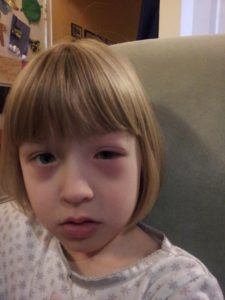The Dangers of Childhood Snoring and Sleep Apnea
We are all aware that many adults snore, but how many times have you heard parents talking about their children snoring? About how cute or funny it is?
Well, snoring does happen with children, but the consequences of childhood snoring can be very serious.
Snoring is the noise caused by the partial blockage or obstruction of air moving in the nasal or mouth passages, and this is anything but cute or funny. Snoring can have a range of severity. It could be due to a minor airway obstruction or an indicator of something call sleep apnea, which has much more severe ramifications than just noise.
With sleep apnea, the airway blockage can be so severe that the person actually stops breathing for even a couple of minutes. This stoppage of breathing obviously reduces the oxygen delivered to the body and the brain. When the brain becomes oxygen deprived and carbon dioxide levels increase, the brain becomes stimulated by carbon dioxide receptors and tells the body to suddenly take a deep breath. This sudden intake of air is the noise that snorers typically make: multiple mildly noisy breaths followed by a loud, sudden gasp. Unfortunately, this sudden gasp wakes up the patient from their most needed sleep, the REM stage. When this happens, the snorer is not only oxygen deprived, but they also become sleep deprived.
So where does childhood snoring fit into this scenario?
Well, children have developing brains. The ongoing oxygen deprivation can and will lead to learning disabilities and cognitive impairment. Yes! This is scary stuff!
In adults, the airway obstruction is often a result of weight gain. When someone puts on extra weight, it doesn’t merely affect their bellies or booties. Fat is distributed throughout the body: arms, legs, NECK, TONGUE, etc. The extra fat in the tissues of the airway cause a narrowing of the airway. To make matters worse, when someone falls asleep on their back, their tongue falls backwards, further obstructing the airway. And for more bad news, as we age, not only does our skin lose its elasticity, but so do the tissues in our airway. These tissues can become more slack and block the airway, too.
If you have been reading my previous blogs, you will know that in adults, snoring and sleep apnea can be treated very successfully. But what about kids?
First, we have to understand why kids snore. Children who snore can be skinny with young, healthy, elastic skin, so fat and loss of skin tone aren’t the reasons. With kids, it is usually the ones whose mouths are always postured open, are prone to many colds, have allergies, and suffer from enlarged tonsils or adenoids who experience snoring or sleep apnea. These kids must be treated. Allergies must be addressed, airway obstructions must be removed, and parents may even consider introducing a CPAP machine while sleeping.
So, if your child snores, try to remember that although you may find it cute, it can be a very dangerous medical situation. Have your child checked out by their physician, and if they won’t do anything about it, call me. I will provide you with the necessary literature to help motivate them into action.
Good luck, and have a happy new year!


